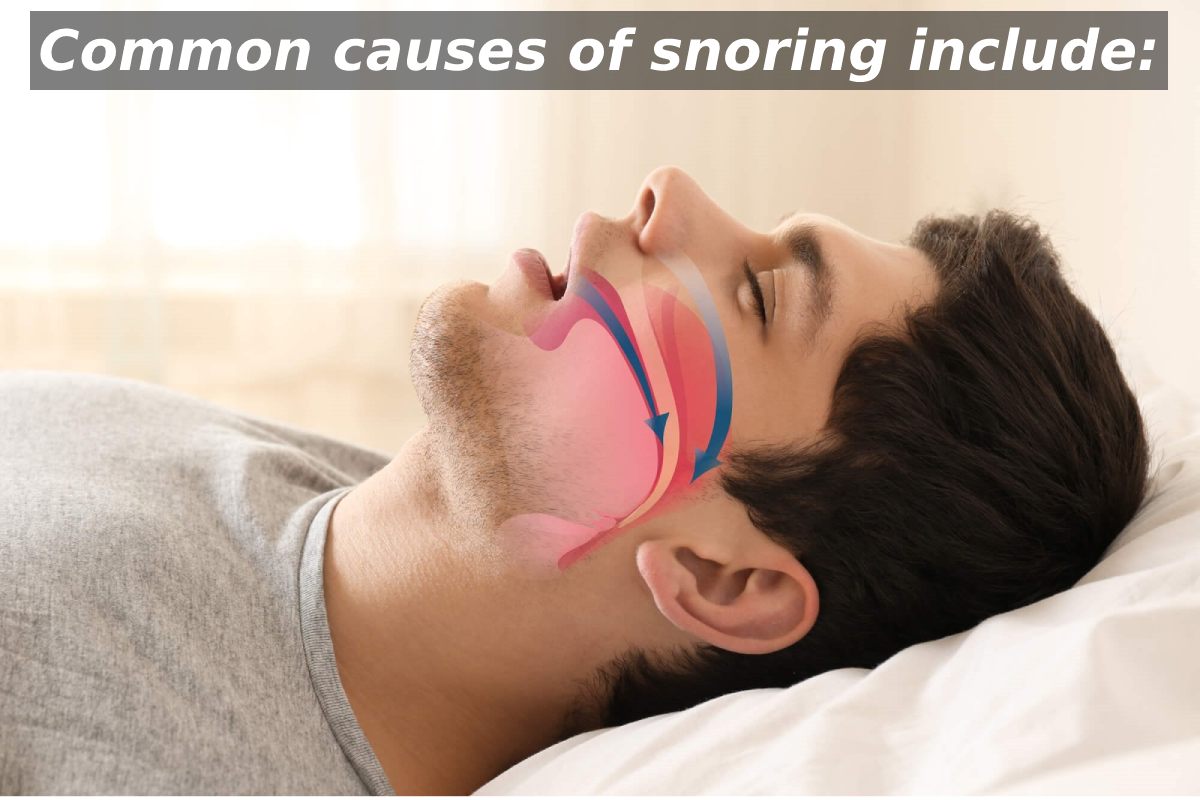Table of Contents
What is Snoring?
Snoring – Almost everyone snores occasionally, and it’s typically nothing to be concerned about. It happens when air cannot freely move through your nose and throat while you sleep. This causes the nearby tissues to vibrate, producing the classic snoring sound. Snorers frequently have excessive throat and nasal tissue or “soft” tissues more prone to vibration. The tongue’s posture might also obstruct even breathing.
Snoring at night can disturb your sleep quality, resulting in daytime weariness, irritation, and increasing health problems. And if your Snoring disrupts your partner’s sleep, it can lead to major marital troubles. Sleeping in different rooms is not the only way to stop it. Several effective treatments are available to help you and your partner sleep better at night and overcome relationship issues caused by it.
Also Read: All You Need To Know About Ash Blue Hair – How Long Does It Last
What Causes Snoring?
Because people snore for various reasons, it’s essential to understand why you snore. Once you know why you snore, you can find the right solutions for more restful and deeper sleep for you and your partner.

Common causes of snoring include:
Age – As you reach middle age and older, your throat becomes narrower, and the tone of the throat muscles decreases. While there’s nothing you can do about aging, lifestyle changes, new bedtime habits, and throat exercises can help prevent snoring.
Overweight or loss of shape – Even if you’re not generally overweight, carrying extra weight just around your neck or throat can cause you to snore. Exercise and weight loss can sometimes be enough to stop it. Adipose tissue and low muscle tone contribute to Snoring.
The way you are made – Men have narrower airways than women and are more likely to snore. A narrow throat, cleft palate, enlarged adenoids, and other physical signs contribute to Snoring are often hereditary. Again, while you can’t control your body type or gender, you can manage your Snoring with the right lifestyle changes, bedtime routines, and throat exercises.
Problems with the nose and sinuses – A blocked airway or stuffy nose makes breathing difficult and creates a vacuum in the throat, leading to Snoring.
Alcohol, tobacco, and drugs – Drinking alcohol, smoking, and certain medications such as tranquilizers such as lorazepam (Ativan) and diazepam (Valium) can increase muscle relaxation, causing more Snoring.
Sleep position – Sleeping on your back causes the flesh in your throat to weaken and block your airways. Changing your sleeping position can help.
What are The Symptoms of Snoring?
Snoring noises can range from subtle vibrations or whistles to thunderous growls, snorts, or rumbles. Some people may be unconscious that they are snoring while sleeping. Snorers may turn and toss at night, wake up with a dry and scratchy throat, and feel fatigued during the day. Sleep deprivation can result in headaches, difficulty concentrating, and mood changes. Some people choke and stop breathing for a few seconds while sleeping. These are sleep apnea symptoms, a condition that, if left untreated, can lead to significant health concerns.
How to Stop It?
You can prevent this by changing your lifestyle, diet, and daily activities. To reduce snoring, you should:
Ask your supplier for nasal congestion relief.
- Raise your headboard a few inches to change the angle and improve air circulation.
- Avoid alcohol and other sedatives before bed.
- Don’t sleep on your back. Sleep on your side.
- Get plenty of exercise, stay active, and maintain a healthy weight.
- Try an anti-snoring pillow that keeps your head and neck in the proper position while you sleep.
How is Snoring Diagnosed?
Your doctor will ask you (and possibly your partner) a few questions, including how often you snore, how your diet and lifestyle affect your sleep and what it sounds like. During the exam, your provider will check your blood pressure, listen to your heart, and examine your mouth, nose, and throat.
Your doctor may direction a sleep study (polysomnogram) to evaluate your sleep patterns. You may be able to do a sleep study at home, or you may have to spend the night at a sleep center. The sleep study evaluates:
- Wave activity of the brain.
- Breathing patterns, including times when you stop breathing or get gas.
- Heart rate and oxygen level.
- Movements during sleep, such as moving arms or legs or tossing and turning.
- Sleep cycles and Snoring.
Your doctor may recommend treatments to improve your posture or open your airways while you sleep. Snoring remedies include:
Lifestyle changes – Avoiding alcohol before bed, changing your sleeping position, and maintaining a healthy weight can reduce it.
- Medications: Cold and allergy medicines relieve nasal congestion and help you breathe freely.
- Nasal strips: Flexible strips stick to the outside of the nose and prevent the nasal passages from remaining open.
- Oral appliances: Wearing oral appliances while you sleep keeps your jaw in the correct position, allowing air to circulate. Your healthcare supplier may refer to this as an oral appliance or mouth guard. A mouthguard used for other purposes, such as sports, will not stop the problem.
Conclusion
Snoring is very common. It is more sharing among men over 50 who are overweight or obese. Everyone can snore at some point in their life.
By understanding the basics of Snoring, you can better understand what makes you snore. Just as it affects your life, your lifestyle also affects your Snoring.
There are many remedies and solutions for it, including products that enthusiastically tell you they will stop it. Many of them work very effectively, but only if they work well for you and your Snoring.
Also read : Impact Of On Health Lifestyle – About, Affects, Problems, and More
